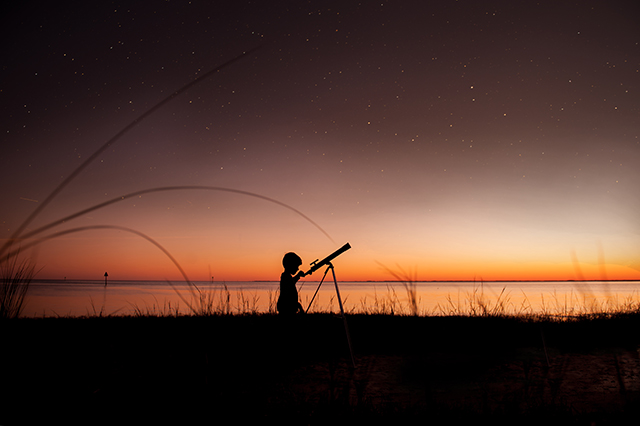Winter nights are long, with twinkling lights on icicle-festooned houses beckoning us to slow down and look. And then, of course, there are the stars. Stars shine more brightly in the crisp, cold air of winter. Frigid and thin, the atmosphere gives a clear view of constellations – and sometimes the northern lights. Whether you’re stargazing for a clear view of the Milky Way or a close encounter with Venus, head to one of these starlit destinations for prime stargazing in the Northeast.
Northeast Michigan
A land of forests and lakes that straddles the Midwest and Northeast, Michigan – especially its northern half – feels like a sanctuary no matter which direction you’re coming from. Though it’s a day’s drive from most hubs for stargazing in the Northeast, Michigan’s Lake Huron shoreline lives up to its nickname, the “Sunrise Coast,” because its nature shines both day and night.
On a long weekend road trip from the crook of the Mitten State’s thumb to its uppermost tip, anyone daring enough to bundle up and step outside the car can hunt for Orion and the Big Dipper at five state-designated Dark Sky Preserves.
Spend the first night scouting constellations at the 640-acre Port Crescent State Park. The next day, cruise up US-23N toward Alpena County, where you can park-hop between Negwegon State Park, Rockport State Recreation Area and Thompsons Harbor. For visitors with time to spare, driving 90 minutes farther north will reveal the state’s world-renowned Dark Sky Place, Headlands International Dark Sky Park.
Cherry Springs State Park
When you’re craving a night of spectacular stargazing in the Northeast, set your GPS to Pennsylvania’s Cherry Springs State Park. Whether you choose to rest your head at one of the park’s 30 campsites, a cozy cabin or a cottage in nearby Coudersport, you can set your sights on Venus, the Andromeda Galaxy and more.
Cherry Springs State Park has been recognized by the International Dark Sky Association as an official International Dark Sky Park. The IDA calls it “one of the best places in the eastern U.S. for stargazing.” It’s not hard to see why – the sprawling park is surrounded by the wild and unpolluted Susquehannock State Forest. The lack of nearby towns (and light pollution) creates a thicket of darkness around the park’s Astronomy Field.
First-time stargazers should visit Cherry Springs State Park during one of the two annual astronomy parties (in June and September).
Acadia National Park
Known as the gateway to Acadia National Park, where Cadillac Mountain offers breathtaking vistas of the town and bay, Bar Harbor, Maine, makes an ideal base for stargazing in the park. While most national parks preserve the night sky enough to bare winter’s shimmering constellations, there are several ideal spots in Acadia to look up and spot dozens of celestial wonders.
- First up: Cadillac Mountain. Accessible by car and popular with both locals and visitors, Cadillac Mountain is one of Acadia National Park’s most popular stargazing destinations. The peak gets crowded, especially in summer, but it’s possible to find an evening picnic spot by wandering a little away from the fray.
- If you prefer a less crowded stargazing station, head to Sand Beach. There, you can walk quietly out onto the sandy stretch of land for mesmerizing views of the southern sky. Remember to pack a flashlight to see your path clearly along the shoreline.
- Drive to Jordan Pond House for a starlit night walk. You’ll be able to meander along the path to Jordan Pond, where you might start seeing double – the brilliant stars above often reflect on the still, frosty pond below.

Geauga Observatory Park
For a stellar getaway that will excite the whole family, head to Geauga Observatory Park in Ohio. It was officially recognized as a Dark Sky Park in 2011 by the IDA, but local astronomers – both amateurs and professionals – started working on the observatory years before that.
Don’t wait until nightfall to visit Geauga Observatory Park. Check in on the permanent astronomy exhibits, hike the .85-mile planetary education trail, stop by the life-sized cornerstones of the Great Pyramid of Giza, then head to the Nassau Astronomical Station.
Check out the Observatory’s schedule of free educational presentations to plan around the topics that most interest your family. From a talk about the Wolf Moon to meteor tracking to group stargazing, astronomers near Geauga have the night sky covered.
Maria Mitchell Association’s Loines Observatory
A 30-mile journey by ferry from Cape Cod, tiny Nantucket Island has a big history. Its stories brim with whalers and lighthouses, shipwrecks and navigation by the stars. The Loines Observatory is operated by the Maria Mitchell Association, a group founded in honor of the island’s famous native astronomer. Maria Mitchell discovered a new comet in 1857.
While you’re unlikely to spot an undiscovered meteorite or comet in the stratosphere, a visit to Loines Observatory is the perfect time to fall under the spell of the Milky Way, distant planets and constellations unseen in northeast cities like New York City, Boston or Philadelphia. Plan your visit on a clear Friday night, during one of the Maria Mitchell Association’s public stargazing events.
What is your favorite place to go stargazing in the Northeast? Let us know in the comments.
One Thought on “5 Stellar Destinations for Stargazing”
Leave A Comment
Comments are subject to moderation and may or may not be published at the editor’s discretion. Only comments that are relevant to the article and add value to the Your AAA community will be considered. Comments may be edited for clarity and length.
















Thanks for this info but how did Ohio and Michigan get into an article about the Northeast?